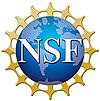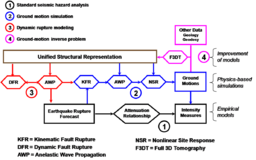Main Page
Contents
Community Modeling Environment (CME)
This is a collaborative wiki site for SCEC's Community Modeling Environment (SCEC/CME). The CME is a collaborative, interdisciplinary research group that applies advanced computer science technology to the problem of seismic hazard analysis. This SCEC community wiki is configured to support our distributed research by providing a collection point for information about SCEC scientific computing research projects.
Collaborative Project Entries
The following link will take you to an alphabetically sorted list of all SCECpedia pages.
SCEC Scientific Software
The following table contains links to SCEC open-source scientific software descriptions and distributions.
Current Activities
- SCEC Event Page Troubleshooting
- Research Computing Continuity Plans
- CARC Storage Migration
- UCVM Release v25.7
- UCVM Install Stampede3
- Preferred Rupture Directivity in Hazard Curve Computations
- U3ETAS Configurations
- HPC Troubleshooting
- Software Development Practices
- Bhatthal Projects and Presentations
- Quakeworx
- CyberShake
- OpenSHA
- Publishing UCERF3-ETAS Event Reports
- SCEC VDO
- CXM Website Review
- SCEC Media
- CSEP
- AWP-ODC Distributions
- Scenario ShakeMaps
- Dockerized Websites
- National Cyberinfrastructure
- OLCF Summit
- Broadband Platform
- Southern California Seismic Velocity Model Vertical Profiles
- Magnitude_Versus_Intensity
- Workplans
- Software Sustainability Project
- SCEC Server Migration
- Docker Hub
- Forecast Data
- Adding iVIP Users
- SCEC RC Working Group
- SDSC Expanse
- ALCF ML Workshop
- CyberShake_BBP_Validation
- Multi-resolution Meshes
- SCEC RC Meeting 2021
- Staff Meeting Oct 2021
- CIG Workshop
- SCEC CyberInfrastructure White Papers (2017-2020)
- IRIS_EMC
- Software Licenses
- CyberShake Distribution
- Testing UCVM Vs Values
- SCEC Testing Systems
- Staff Meeting
- High-F
- Stand-up Meetings
- Software Projects
- Disk Usage
- Magnitude Versus Intensity
- CyberShake_Study_20.5
- UCVM Verification
- CSEP_Working_Group
- SCEC_EarthScience_DTS_HPC
- Cyberinfrastructure Center of Excellence
- Dornsife Technology Services (DTS)
- SC19
- Open Storage Network
- Rupture_Variation_Generator_v5.4.2
- Cascadia Simulations
- Ridgecrest Simulations
- Research Computing Meeting
- SCEC CXM Inventory
- ShakeMovies
- Brawley Seismic Zone Simulations
- SVN
- Zenodo and GitHub
- Callaghan Presentations
- Maechling Presentations
- Allocation Planning
Recent Activities
- Software At SCEC Responses
- Research Computing
- SSA Velocity Model Workshop 2019
- Software Workshop 2018
- Validation_Events
- Software
- Transient Detection
- AGU Fall 2018
- SC18
- LA Vertical Profiles
- CVM-H 15.1 Maps
- Wills Map
- CyberShake Training
- CyberShake_Data_Access
- CyberShake Study 17.3
- Git
- GMSV Simulation Datasets
- Blue_Waters_Project
- CME_Projects
- HPC Software
- CME Software Development Group
- Machine Learning
- UCVM Tutorial Pages
- UCVM Notes
- UCVM FAQ
- UCVM cvms/cvms5/cvmsi GTL
- UCVM v25.7 with external model data directory CVM_LARGEDATA_DIR
- UCVM ucvm with sw4 using cvmsi
- UCVM create new model with ucvm2mesh
- UCVM cvmsi tapering
- UCVM sfcvm geomodelgrid
- UCVM install on Frontera
- UCVM cvmsi tapering for CyberShake Study 22.12
- UCVM cvms, cvmsi near-surface comparison
- UCVM cca/cvms5 comparing builtin-gtl vs elygtl:ely
- UCVM VS30 tree map(Thompson 2018)
- UCVM VS30 etree map (Wills 2015) UCVM's interpolation
- UCVM z1,z2.5 for CCA06 with GTL, CVM-S4.26.M01
- UCVM 3D Viz
- UCVM svm1d
- UCVM svm1d and elygtl
- UCVM etree for Garner Valley
- UCVM elevation vs depth, model boundary
- UCVMC basin depth study, poly tech, Pomona
- UCVMC how to plot cross_section and depth_profile
- CVM for CyberShake Study 18.8
- UCVMC How to process bin data
- UCVMC_CS17.3-H_plots
- UCVM Density Formula
- UCVM v18.5
- UCVM_Vs30
- CS173-H
- UCVM Review
- Registering CS173 into UCVM
- CVM Projection Issue Discussion
- Mesh Plotting Scripts
- ucvm2mesh-mpi
- Compare_UCVMC_to_UCVMP
- CCA06 Test Points
- Bay Area Velocity Model Z2.5 data
CME Outcomes
Recent Earthquake Information
An important goal of SCEC earthquake research is to develop improved seismic hazard information about future earthquakes by developing physics-based predictive models of earthquake processes and Improved seismic hazard estimates should lead to reduced seismic hazard risks to people and important societal infrastructure.
CME Research Support
Southern California Earthquake Center (SCEC) and SCEC/CME research is funded by National Science Foundation (NSF) Cooperative Agreements EAR-0106924 and USGS Cooperative Agreement 02HQAG0008, and NSF awards EAR- 074493, EAR-0949443, OCI-0832698, and OCI-0832698. This research is supported by an allocation of advanced computing resources provided by the National Science Foundation (NSF). Computations are performed at San Diego Supercomputer Center, and the Texas Advanced Computing Center (TACC) at The University of Texas at Austin, the National Center for Supercomputer Applications (NCSA) provide HPC resources. Computations are supported by the University of Southern California Center for Center for High-Performance Computing (HPC). Our research uses HPC resources provided by the U.S. Department of Energy (DOE) through an Innovative and Novel Computational Impact on Theory and Experiment (INCITE) program allocation award. An award of computer time was provided by the INCITE program. This research uses resources of the Argonne Leadership Computing Facility at Argonne National Laboratory, which is supported by the Office of Science of the U.S. Department of Energy under contract DE-AC02- 06CH11357. This research also used resources of the Oak Ridge Leadership Computing Facility, which is a DOE Office of Science User Facility supported under Contract DE-AC05-00OR22725.
See Also
Additional information about SCEC earthquake system science research is available on related SCEC web sites including:
License
Except as otherwise noted, the contents of this site are licensed under the Creative Commons Attribution 3.0 Unported License, and software distributions are licensed under the Open Source Initiative approved licenses including BSD-3 and Apache 2.0 License. For details, see our Site Policies.
![]()



